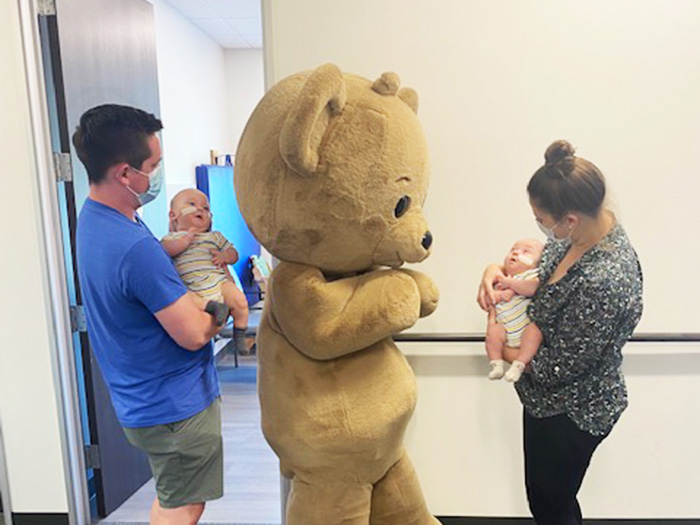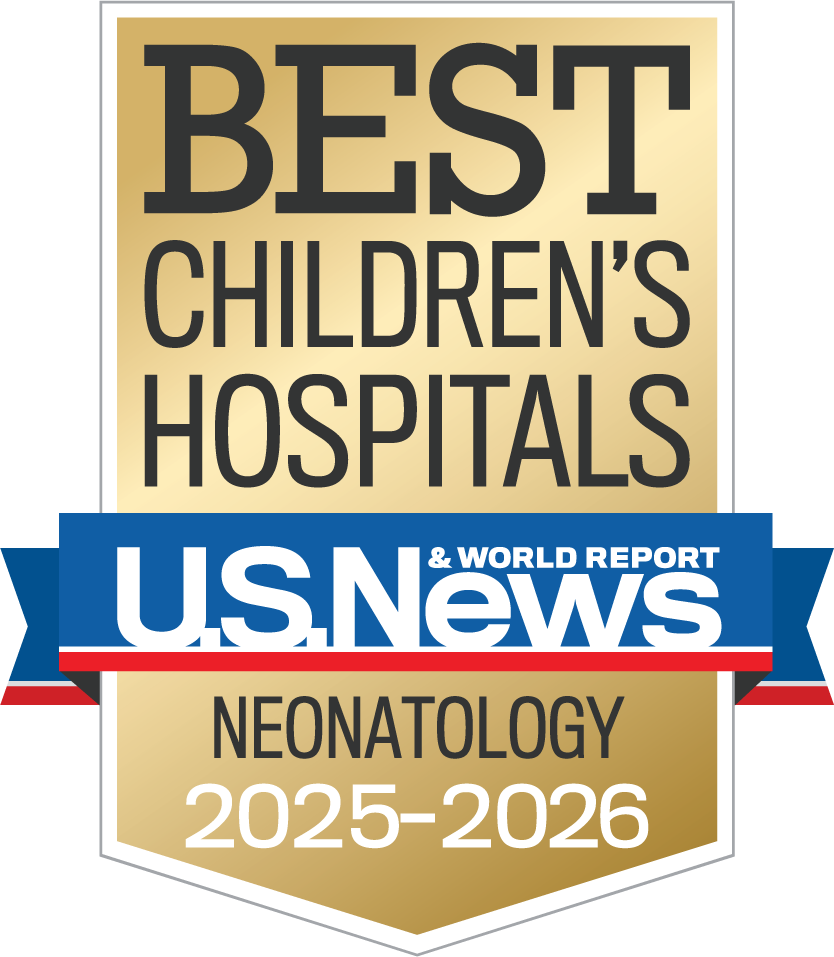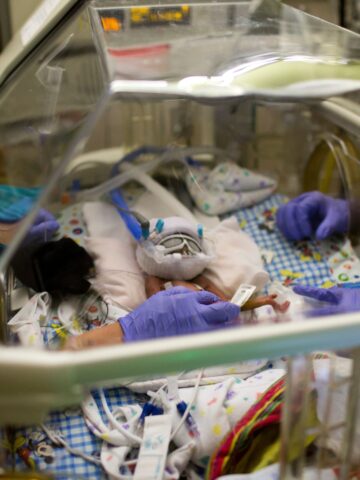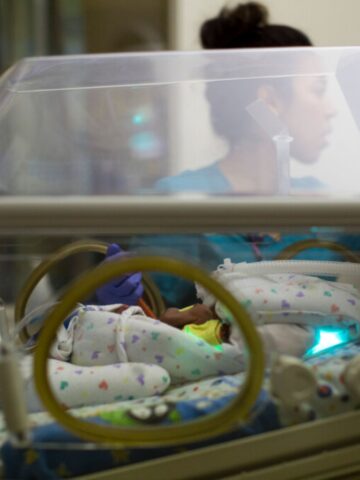Innovative patient-centered care from the start
Survival rates for infants born less than 23 weeks’ gestation is incredibly rare, and to live without major motor or cognitive deficits is almost unheard of. However, advances in technologies, procedures and philosophies of care have allowed the NICU team at Children’s Hospital of Orange County (CHOC) to produce results that even now are possible at only a few institutions across the U.S.
Born at just 22 weeks’ gestation, Henry and Hugo Heacock made CHOC history as the youngest twins to survive after 165 days in the NICU. The premature delivery occurred across the street at St. Joseph Hospital. The twins were immediately transported to CHOC in Orange County where staff took the boys to the top-rated Level 4 NICU, home to the CHOC Small Baby Unit. Equipped with the latest technology, this specialized unit and highly trained team is dedicated to caring for preterm infants born before 28 weeks or weighing less than 1,000 grams at birth.
Dr. Robert Hillyard, a neonatologist and regional director for the neonatal division at CHOC, and co-medical director of CHOC Telehealth, received a call from the NICU around 2 a.m. that the twins were coming, and their parents wanted to go ahead with care.
“Even with the best equipment, facilities and team, we cannot make every baby born at that age survive,” Dr. Hillyard says. “There are very few delivery rooms across the country that are prepared to move forward on 22 weeks twins on a moment’s notice. That ability comes with an expert on-call team 24/7. Our outstanding care patterns, technology and teamwork allowed me to look their parents in the eye and say, ‘It’s not a bridge too far. We aren’t causing harm by moving forward. Let’s see where the babies take us.’”
“At CHOC, we apply evidence-based care and quality improvement methods for sustained excellent outcomes,” says Dr. Michel Mikhael, medical director of the CHOC Small Baby Unit and associate program director of the University of California, Irvine Neonatal-Perinatal Fellowship Program. “We partner with families to make well-informed, shared decisions. A shared philosophy among our providers enables us to produce excellent survival outcomes for babies born at extreme prematurity.”


Rising to every challenge
Megan, the twins’ mother and a resident in obstetrics/gynecology, says that one of the biggest challenges she and her husband, Levi, faced was knowing the odds of survival. “It’s hard not to think of worst-case scenarios when you are aware of the worst,” Megan says. “The data shows us that the outcomes for Caucasian boys are far less promising than for girls. Not to mention, oftentimes, there are cut-offs for resuscitation for babies born under 24 weeks.”
From the start, the twins faced life-threatening difficulties that required all the skills CHOC’s NICU team had to offer. Henry developed a skin fungal infection, which a nurse detected early, allowing for successful treatment. Hugo suffered a spontaneous intestinal perforation that necessitated emergency surgery and stoma placement. Both boys required the placement of a Piccolo device and breathing assistance. Despite these challenges to survive, Henry and Hugo are now happy as can be, at home with their parents after 165 days. Both are surpassing age-adjusted milestones.
Creating a supportive, womb-like environment
The CHOC NICU utilizes advanced technology to give preterm babies the best chance at life. But the care at CHOC’s NICU goes far beyond what technology can provide.
Every aspect of the NICU environment is designed with a minimalist approach in mind to mimic the gentle, protected quietness of the womb. Features of the space include:
- Low lighting to protect delicate eyes
- Daily skin-to-skin contact between mother and baby
- Quiet areas and staff-wide sound reduction efforts
- Shared rounds to allow still-developing infants as much unstimulated time as possible
Providing a supportive environment for the parents is also vital. Preterm infants cannot speak for themselves, and parents often wonder if they are making the right decisions. “As a parent, it’s so important for you to be involved,” Levi says. “You know your baby the best. Ask questions, be present, and try to make sure you understand what is going on as best as you can.”

The CHOC NICU team knows the stakes are high and is constantly working with the family to ensure all their needs are met. No matter the outcome for the baby, Dr. Hillyard says, it’s essential that parents have the tools they need to survive their time in the NICU emotionally, financially and with their family intact. “We can create the circumstances for success, but we don’t control the outcome,” Dr. Hillyard says. “But we can absolutely offer a trusting relationship with the parents. Regardless of the outcome, that bond creates something you can live with.”
Addressing future concerns through today’s care
Nutrition is a crucial aspect of NICU care. Without proper nutrition, preterm infants are unable to grow and develop properly. However, these premature babies face unique challenges.
Due to their developmental level and treatments needed to sustain them in their early days, preterm babies frequently have feeding difficulties that can persist into childhood and beyond. Special care must be taken at feeding time and when considering ventilation or any treatments involving the mouth to help mitigate these issues.

“When you look at a full-term baby, everything that goes into their mouth is pleasurable for them,” Dr. Hillyard says. “When an extremely young baby has had tubes and other noxious things going into its mouth, they don’t develop to think that things going in their mouth will be a good thing. This translates to feeding and oral motor challenges. The baby may be hungry, but they may not want to eat.”
A feeding tube is necessary until the infant develops oral feeding skills, however our use of non-invasive CPAP respiratory support for our extremely premature babies eliminates the noxious stimulation of the large endotracheal tube used with traditional ventilator support. Breast milk is also used whenever possible to provide nutrients and strengthen the bond between mother and baby.
While in the NICU, Henry and Hugo each had a nasal gastric tube placed for feeding and received noninvasive respiratory support. They were discharged home with supplemental oxygen, tube feeding and a plan to wean them off both interventions. Even at discharge, though, they were smiling and making eye contact with their caregivers, signs of excellent early social and motor skill development.
“We cannot express our gratitude enough to the entire CHOC team,” Megan says. “Our experience as NICU parents is something we never could have imagined, and it will forever impact how I practice medicine and interact with my patients and their families.”
Taking the next steps
Extremely premature babies discharged from CHOC typically receive care from the Bridge Clinic, which may include ongoing support for lingering feeding and respiratory concerns.
Dr. Hillyard, Dr. Mikhael and the CHOC NICU team pride themselves on providing evidence-based care centered on the needs of the babies and families they serve. Through ongoing research, quality improvement measurement and tracking patient outcomes, they work together to add to the knowledge bank of data-driven neonatal care.
“At CHOC, our Small Baby Unit survival without major morbidity is regularly above national benchmarks,” Dr. Mikhael says.
“Our survival outcomes in the Small Baby Unit were revolutionary from the beginning,” Dr. Hillyard adds. “But it isn’t enough to start something. You need to constantly improve it. You transform your community by looking forward to where you need to be and asking what you can do better. That all came into play with Henry and Hugo. We had the right team and the right equipment. We built a trusting relationship with their parents. We looked forward and ended up with two happy little babies.”

CHOC was named one of the nation’s best children’s hospitals for neonatology by U.S. News & World Report in its 2025-26 Best Children’s Hospitals rankings.




